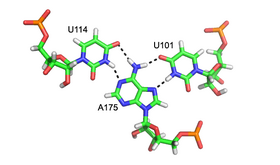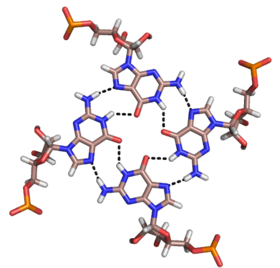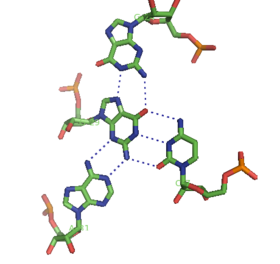核酸三級結構
核酸三級結構是核酸聚合物的三維形狀[1]。 RNA和DNA分子具有從分子識別到催化的各種功能。 這些功能需要精確的三維三級結構。 雖然這種結構多樣且看似複雜,但它們由重複的,易於識別的三級結構基序組成,用作分子構建模塊。 RNA和DNA三級結構的一些最常見的基序如下所述,但該信息基於有限數量的解析結構。
螺旋結構
[編輯]
雙螺旋
[編輯]雙螺旋是生物DNA的主要三級結構,也是RNA的可能結構。據信在自然界中發現了三種DNA構象,即A-DNA,B-DNA,和Z-DNA。 詹姆斯·杜威·沃森(James D. Watson)和弗朗西斯·克里克(Francis Crick)描述的「B」形式被認為在細胞中占主導地位[2]。詹姆斯·D·沃森和弗朗西斯·克里克將這種結構描述為半徑為10Å且間距為34Å的雙螺旋,每隔10 bp序列繞其軸旋轉一圈[3]。雙螺旋在溶液中每10.4-10.5鹼基對圍繞其軸旋轉一圈。這種扭曲頻率(稱為螺旋節距)很大程度上取決於每個基座對鏈中的鄰居施加的堆疊力。雙螺旋RNA採用類似於A型結構的構象。
其他構造是可能的;事實上,現在只有字母F,Q,U,V和Y可用於描述將來可能出現的任何新的DNA結構[4][5]。然而,大多數這些形式是合成產生的,並且在天然存在的生物系統中未觀察到。
主要的和次要的凹槽三聯體
[編輯]次要的凹槽三股螺旋是普遍存在的RNA結構基序。 因為與次要的凹槽的相互作用通常由核糖的2'-OH介導,所以這種RNA基序看起來與其DNA等同物非常不同。 次要的凹槽三股螺旋的最常見的例子是A-次要基序,或腺苷鹼基插入次要的凹槽(見上文)。 然而,該基序不限於腺苷,因為還觀察到其他核鹼基與RNA次要的凹槽相互作用。
次要的凹槽為插入的底座提供了近乎完美的補充。 這允許最佳的范德華接觸,廣泛的氫鍵的和疏水的表面埋藏,並產生高能量有利的相互作用。 因為次要的凹槽三元組能夠穩定地包裝自由環和螺旋,它們是大核糖核苷酸結構中的關鍵元件,包括I組內含子[10], II組內含子[11],和核糖體。
儘管標準A型RNA的主要的凹槽相當窄,因此與次要的凹槽相比,三重相互作用的可用性較小,但在幾種RNA結構中可觀察到主要的凹槽三重相互作用。 這些結構由鹼基對和Hoogsteen相互作用的幾種組合組成。 例如,在50S核糖體中觀察到的GGC三聯體(GGC氨基(N-2)-N-7,亞氨基 - 羰基,羰基 - 氨基(N-4); 沃森-克里克),由沃森-克里克型GC組成 配對和進入的G,其形成在規範配對中涉及的兩個鹼基之間的氫鍵相互作用的偽Hoogsteen網絡[8]。其他值得注意的主要的凹槽三聯體的例子包括(i)左圖中所示的II族內含子的催化核心[6],(ii)在人類的端粒酶RNA組分中觀察到的催化必需的三股螺旋[7],和(iii)SAM -II riboswitch[12]。
來自Hoogsteen的三股螺旋DNA也可能在B型DNA的主要溝槽中逆轉Hoogsteen氫鍵。
四聯體
[編輯]除了雙股螺旋和上述三股螺旋之外,RNA和DNA也可以形成四股螺旋的四聯體。 RNA鹼基四聯體有多種結構。 通過Hoogsteen氫鍵,四個連續的鳥嘌呤殘基可在RNA中形成四股螺旋,形成「Hoogsteen環」(見圖)。 G-C和A-U對也可以形成鹼基四聯體,其中沃森-克里克(Watson-Crick)配對和次要的凹槽中的非規範配對的組合[13]。
孔雀石綠色的適體的核心也是一種具有不同氫鍵模式的鹼基四聯體(見圖).[9]。 四聯體可以連續重複幾次,產生非常穩定的結構。
參閱
[編輯]參考資料
[編輯]- ^ 國際純化學和應用化學聯合會,化學術語概略,第二版。(金皮書)(1997)。在線校正版: (2006–) "tertiary structure"。doi:10.1351/goldbook.T06282
- ^ Richmond TJ, Davey CA. The structure of DNA in the nucleosome core. Nature. May 2003, 423 (6936): 145–50. Bibcode:2003Natur.423..145R. PMID 12736678. doi:10.1038/nature01595.
- ^ Watson JD & Crick FH. Molecular structure of nucleic acids; a structure for deoxyribose nucleic acid (PDF). Nature. April 1953, 171 (4356): 737–8 [2018-11-09]. Bibcode:1953Natur.171..737W. PMID 13054692. doi:10.1038/171737a0. (原始內容存檔 (PDF)於2007-02-04).
- ^ Bansal M. DNA structure: Revisiting the Watson-Crick double helix. Current Science. 2003, 85 (11): 1556–1563.
- ^ Ghosh A, Bansal M. A glossary of DNA structures from A to Z. Acta Crystallogr D. 2003, 59 (4): 620–626. PMID 12657780. doi:10.1107/S0907444903003251.
- ^ 引用錯誤:沒有為名為
Toor08的參考文獻提供內容 - ^ 7.0 7.1 PDB 2K95; Kim NK, Zhang Q, Zhou J, Theimer CA, Peterson RD, Feigon J. Solution structure and dynamics of the wild-type pseudoknot of human telomerase RNA. J. Mol. Biol. December 2008, 384 (5): 1249–61. PMC 2660571
 . PMID 18950640. doi:10.1016/j.jmb.2008.10.005.; rendered with PyMOL (頁面存檔備份,存於網際網路檔案館)
. PMID 18950640. doi:10.1016/j.jmb.2008.10.005.; rendered with PyMOL (頁面存檔備份,存於網際網路檔案館)
- ^ 8.0 8.1 PDB 1RAU; Cheong C, Moore PB. Solution structure of an unusually stable RNA tetraplex containing G- and U-quartet structures. Biochemistry. September 1992, 31 (36): 8406–14. PMID 1382577. doi:10.1021/bi00151a003.; rendered with PyMOL (頁面存檔備份,存於網際網路檔案館)
- ^ 9.0 9.1 PDB 1FIT; Baugh C, Grate D, Wilson C. 2.8 A crystal structure of the malachite green aptamer. J. Mol. Biol. August 2000, 301 (1): 117–28. PMID 10926496. doi:10.1006/jmbi.2000.3951.; rendered with PyMOL (頁面存檔備份,存於網際網路檔案館)
- ^ Szewczak AA, Ortoleva-Donnelly L, Ryder SP, Moncoeur E, Strobel SA. A minor groove RNA triple helix within the catalytic core of a group I intron. Nat. Struct. Biol. December 1998, 5 (12): 1037–42. PMID 9846872. doi:10.1038/4146.
- ^ Boudvillain M, de Lencastre A, Pyle AM. A tertiary interaction that links active-site domains to the 5' splice site of a group II intron. Nature. July 2000, 406 (6793): 315–8. PMID 10917534. doi:10.1038/35018589.
- ^ Gilbert SD, Rambo RP, Van Tyne D, Batey RT. Structure of the SAM-II riboswitch bound to S-adenosylmethionine. Nat. Struct. Mol. Biol. February 2008, 15 (2): 177–82. PMID 18204466. doi:10.1038/nsmb.1371.
- ^ Batey RT, Gilbert SD, Montange RK. Structure of a natural guanine-responsive riboswitch complexed with the metabolite hypoxanthine. Nature. November 2004, 432 (7015): 411–5. Bibcode:2004Natur.432..411B. PMID 15549109. doi:10.1038/nature03037.




